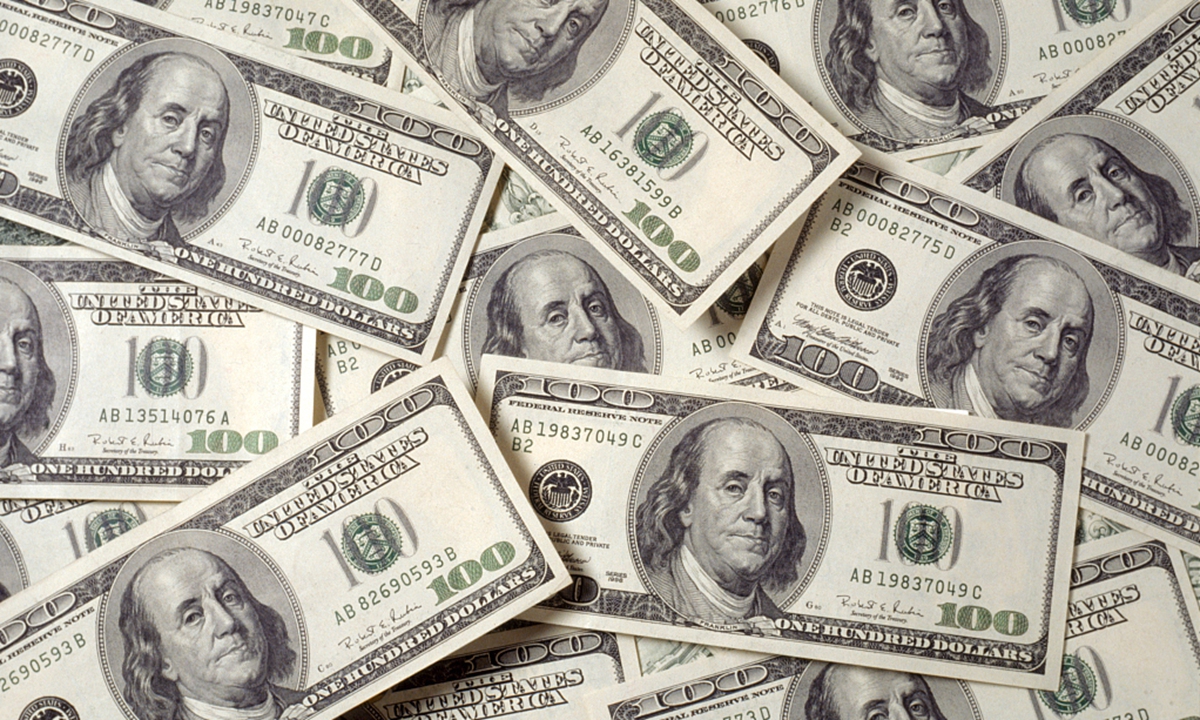
Photo:VCG
Since the conflict between Russia and Ukraine broke out on February 24, millions of people have been affected and global markets trembled as investors grapple with swift US-led sanctions. But for US President Joe Biden, the crisis appears to have lifted his otherwise failing presidency so far.
Over the past three weeks, at every chance he gets, Biden has touted non-stop how he and his administration were able to rally US allies to punish Russia. "I spent countless hours unifying our European Allies," he said in his first State of the Union address at the US Congress.
However, even as Biden is taking a victory lap over US "leadership" among what he called "freedom-loving nations in Europe, the Americas and the Asian and African continents," his all-out economic campaign against Russia has also exposed cracks in the power of the US dollar in global trade and financial systems.
As the US and its allies went "nuclear" by imposing sanctions against Russia, barring financial transactions and energy trade and seizing Russian assets, many around the world saw firsthand the danger of putting all eggs in one basket - the dollar-dominated system. Some are understandably worried about potential losses and risks from Western sanctions against Russia, even though they are not the target and are now wondering what to do next.
India, the world's sixth-largest economy, is certainly one of them. This week, local media reports said that the country was planning to buy Russian oil at discounted prices and considering the Chinese yuan as a reference currency in an India-Russia payment settlement mechanism. The rupee-ruble trade mechanism will allow Indian exporters to be paid in rupees for their exports to Russia instead of dollars or euros amid sanctions against Russia.
Also, media reported this week that Saudi Arabia, one of the world's largest oil producers, was considering ditching the US dollar in its oil exports to China. The Saudi side is in "active talks" with Beijing to price some of its oil exports to China in the Chinese yuan, the Wall Street Journal reported, noting that the move would dent the US dollar's dominance over the global petroleum market.
It is important to point out that both the Indian and Saudi governments have not publically announced such plans, and that they are still far from materializing if they even do come true. Also, it is equally important to note that even though reports mentioned the possible use of the Chinese yuan, we should not get ahead of ourselves thinking that the Chinese currency, or any other currency, can challenge the current status of the US dollar in global trade and financial markets, let alone replace it. It is more than safe to say that it will not happen anytime soon. If anything, the sanctions have shown that the dominance of the US dollar is still solid.
The point, however, is that such supremacy has shown cracks. The US dollar gained a dominant position not because of the currency itself has value, but because of the US government's credibility. In other words, the vast majority of the countries around the world adopt the dollar payment system because they have trust in the stability of the US' government, economy and currency.
That trust has been slowly but steadily evaporating in recent years as the US government has been increasingly abusing its financial hegemony and constantly wielding the stick of sanctions against both its perceived adversaries and allies, and using its power to bully and illegally seize the dollar assets of other countries.
That could get worse as the US, after being humiliated in recent wars, might resort to financial weapons rather than US soldiers to punish any country that does not bow to its will. Again, no country will be off limits when it comes to US sanctions, as former US President Donald Trump showed with his sanctions against European countries and other US allies. About 30 countries have joined the US to sanction Russia, but all of them have been or will be targeted by Washington someday. Keep in mind that it is widely believed that Trump will run again in 2024.
So, the bottom line is that more and more countries around the world have doubts about the US government and the US dollar and they are seeking safe alternatives. Additionally, the more Biden boasts about its ability to cripple other economies at will, the less the world will have faith in the US and its currency. Right now, US elites are complacent thinking no currency can challenge the dollar. They may be right about that. But who says the world has to be dominated by one currency? Would a multi-currency payment system be much safer and stable for all?




